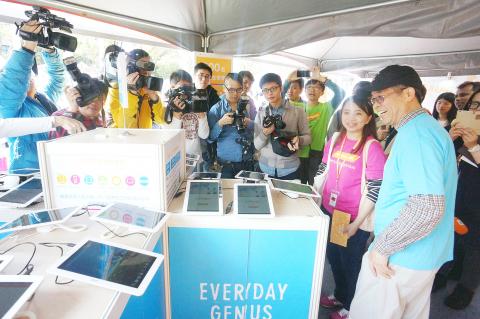MediaTek Inc (聯發科), which designs chips used in smartphones from major Chinese brands including Xiaomi Corp (小米) and Lenovo Group (聯想), yesterday launched a global recruitment program to hire 2,000 new employees to cope with the company’s rapidly growing businesses.
MediaTek launched the program at a jobs fair held by National Taiwan University in Taipei yesterday. The program is part of the company’s broader efforts to boost its research and development capabilities to prepare for intensifying competition.
“MediaTek has 10,000 employees working in 27 locations in 12 countries. They work in different divisions, including marketing, research and development and customer services,” MediaTek chairman Tsai Ming-Kai (蔡明介) said during a speech at the jobs fair.

Photo: CNA
“MediaTek offers an environment for employees to learn and grow with world-class talents,” Tsai said.
To support the company’s strong growth this year and in the longer term, MediaTek plans to boost research and development spending by 20 percent annually this year, as it foresees a need to develop advanced patents for 4G long-term evolution (LTE) technology, the firm said.
MediaTek allocated 20.3 percent of its total revenue for research and development last year, according to statistics released two weeks ago by IC Insights Inc.
Meanwhile, MediaTek aims to double its LTE market share in China to 40 percent this year, taking on larger rival Qualcomm Inc.
“This year will be another year of investment for MediaTek. We will significantly expand research and development resources to accelerate development of new products and new technologies,” company president Hsieh Ching-jiang (謝清江) told investors last month.
“We hope to recruit top talent from around the world to broaden our product lines. We also plan to invest on advanced processor manufacturing and cutting-edge technologies,” Hsieh said.
MediaTek is broadening its smartphone chip lineup and expanding into new areas, including chips for wearable devices.
With new products in the pipeline and fast-growing LTE chip demand from China, the company aims to grow its revenue by 10 to 20 percent this year from a record-high of NT$213.06 billion (US$6.74 billion) last year.
To entice high-quality potential candidates, MediaTek is offering salaries starting at NT$1 million per year for new employees with a master’s degree, and those who have earned their doctorate would receive at least NT$1.5 million per year, the company said. The offerings do not include annual employee bonuses or any other compensation.
The Hsinchu-based company yesterday also launched an internship program for 200 college students from Taiwan and overseas to work as apprentices at MediaTek during the summer vacation.

STEEP DECLINE: Yesterday’s drop was the third-steepest in its history, the steepest being Monday’s drop in the wake of the tariff announcement on Wednesday last week Taiwanese stocks continued their heavy sell-off yesterday, as concerns over US tariffs and unwinding of leveraged bets weighed on the market. The benchmark TAIEX plunged 1,068.19 points, or 5.79 percent, to 17,391.76, notching the biggest drop among Asian peers as it hit a 15-month low. The decline came even after the government on late Tuesday authorized the NT$500 billion (US$15.2 billion) National Stabilization Fund (國安基金) to step in to buoy the market amid investors’ worries over tariffs imposed by US President Donald Trump. Yesterday’s decline was the third-steepest in its history, trailing only the declines of 2,065.87 points on Monday and

TAKING STOCK: A Taiwanese cookware firm in Vietnam urged customers to assess inventory or place orders early so shipments can reach the US while tariffs are paused Taiwanese businesses in Vietnam are exploring alternatives after the White House imposed a 46 percent import duty on Vietnamese goods, following US President Donald Trump’s announcement of “reciprocal” tariffs on the US’ trading partners. Lo Shih-liang (羅世良), chairman of Brico Industry Co (裕茂工業), a Taiwanese company that manufactures cast iron cookware and stove components in Vietnam, said that more than 40 percent of his business was tied to the US market, describing the constant US policy shifts as an emotional roller coaster. “I work during the day and stay up all night watching the news. I’ve been following US news until 3am

Six years ago, LVMH’s billionaire CEO Bernard Arnault and US President Donald Trump cut the blue ribbon on a factory in rural Texas that would make designer handbags for Louis Vuitton, one of the world’s best-known luxury brands. However, since the high-profile opening, the factory has faced a host of problems limiting production, 11 former Louis Vuitton employees said. The site has consistently ranked among the worst-performing for Louis Vuitton globally, “significantly” underperforming other facilities, said three former Louis Vuitton workers and a senior industry source, who cited internal rankings shared with staff. The plant’s problems — which have not

TARIFF CONCERNS: The chipmaker cited global uncertainty from US tariffs and a weakening economic outlook, but said its Singapore expansion remains on track Vanguard International Semiconductor Corp (世界先進), a foundry service provider specializing in producing power management and display driver chips, yesterday withdrew its full-year revenue projection of moderate growth for this year, as escalating US tariff tensions raised uncertainty and concern about a potential economic recession. The Hsinchu-based chipmaker in February said revenues this year would grow mildly from last year based on improving supply chain inventory levels and market demand. At the time, it also anticipated gradual quarter revenue growth. However, the US’ sweeping tariff policy has upended the industry’s supply chains and weakened economic prospects for the world economy, it said. “Now